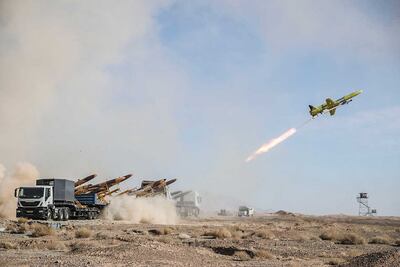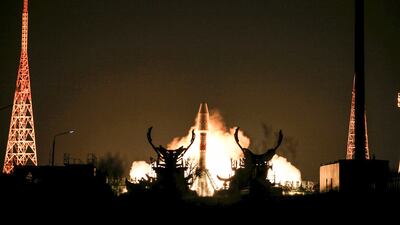Iran will allow Russian to use its new spy satellite to gather intelligence on Ukrainian troop movements, it has been reported.
The Khayyam satellite, to be launched on Tuesday, will also significantly improve Tehran’s ability to spy on military sites throughout the Middle East, analysts have warned.
But as part of a growing military pact between Iran and Russia, the device equipped with advanced high-resolution cameras will be used for several months to track Ukrainian forces for potential missile targeting, The Washington Post reported.
Despite building the satellite for Iran, Moscow is understood to have told Tehran that it intends to first use it to assist in its faltering war effort in Ukraine, western officials have disclosed.
It is understood that the Iranian satellite will be used to spy on the Ukraine build-up and river crossings around the Russian-occupied city of Kherson, which is coming under sustained attack from opposition troops.
It might also be used to locate the highly successful US-donated Himars long-range precision missiles that have devastated Russian ammunition stockpiles and command bunkers.
Once handed back to Iran, the Khayyam, developed in a secret four-year deal with the Islamic Revolutionary Guard Corps, will be used for constant surveillance of military facilities and key infrastructure, such as oil production sites in the Gulf Region and Israel.
Iran has previously used precise co-ordinates from aerial surveillance to attack Saudi Arabia’s oil production sites in 2019 and in Abu Dhabi in January this year in a drone attack that killed three people.
The Iranians could also send high-resolution photographs and geolocation data to pro-Iranian militia groups across the Middle East, although it claims the Khayyam will be used to monitor water use and agriculture.

The imagery will likely be passed to Hezbollah militants in southern Lebanon and to Houthi rebels in Yemen, who have launched numerous rocket and killer-drone attacks on Saudi Arabia. Iran has previously helped terrorist groups to launch rocket attacks on military bases in Iraq, included those hosting US and Nato troops.
Richard Goldberg, a former Iran analyst on the US National Security Council, told the Post that the new satellite was a “clear and present danger to the United States and our allies in the Middle East and abroad”.
He said: “As Iran perfects its missile arsenal — from short, medium to longer-range missiles, alongside its growing UAV capability throughout the Middle East — being able to synch those capabilities with satellite capabilities and surveillance will only increase the lethality of the Iranian threat.”
In return, Russia has secured up to 46 of Iran’s advanced Shahed 129 armed unmanned aerial vehicles that can fire anti-tank missiles and transmit pictures and video. Ukraine claimed these weapons arrived on Saturday.
Iran’s own attempts to launch the Noor-1 military reconnaissance satellites resulted in technical difficulties in an incomplete mission two years ago. However, the regime is still developing a rocket called the Zuljanah, which will enable the launching of more spying devices.
A Russian Soyuz rocket will launch the Khayyam, named after a medieval Persian mathematician, from the Baikonur space complex in Kazakhstan, space agency Roscosmos confirmed in a statement.
The vehicle has a 1.2-metre resolution camera, which may not match the capabilities of American spy satellites but will be a marked improvement on current Iranian technology.
This week’s launch is part of a growing military and political alliance between the two countries coming two weeks after President Vladimir Putin made a rare trip abroad when he travelled for meetings with Iran’s leaders well, as Turkey’s President Recep Tayyip Erdogan.
After the discussions in Tehran, the Iranian Supreme Leader Ali Khamenei praised his government’s “long-term co-operation” with Moscow.


